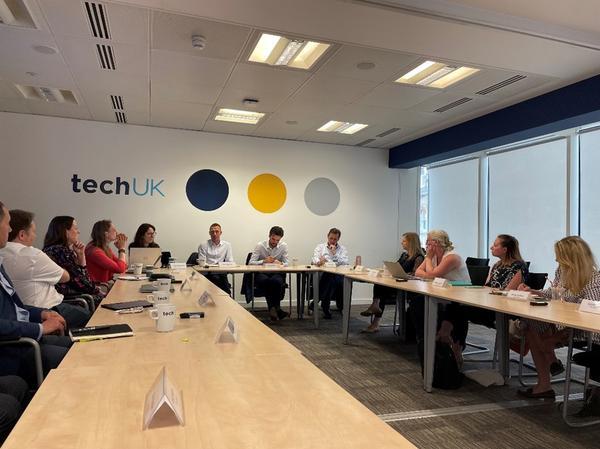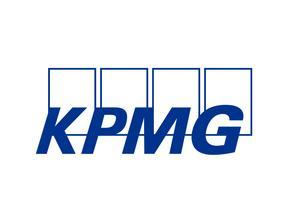Bridging the digital skills gap in the smarter state
Together with its members, government, and the public sector, techUK has been shaping what the future of a smarter state could look like as part of its annual conference. We all want to see a smarter state, for the benefit of both public service efficiency itself and to deliver a better experience to citizens – but there are some critical blockers to this including a lack of digital skills, limited data interoperability and legacy IT.
techUK, together with KPMG, is convening a series of workshops to identify practical solutions to achieving the vision. The first one looked at reframing legacy IT, while the second session, held on 16 May, focused on how we can bridge the digital skills gap – which is essential if we are to sustain and deliver services in a smarter state.
Bringing together the wider digital skills ecosystem, the workshop included representatives from industry and academia as well as senior digital leaders from across Cabinet Office, Foreign, Commonwealth & Development Office (FCDO), Brent Council, Home Office and NHS England.
To help frame the discussion, opening remarks came from Thomas Beautyman, Deputy Director, Government Digital Capability, Central Digital & Data Office, Cabinet Office; Morgan Jones, Head of Industry Engagement, FCDO; and Adrian Clamp, Partner, Head of Digital Transformation, Connected Enterprise, KPMG. They set out the challenge and opportunity as well as articulating what we mean by digital skills and who we are talking about in this context.

Reason for optimism
Thomas Beautyman kicked us off with the national perspective. He began with two numbers that he shared at the Building the Smarter State conference last year: 3,837, which at that stage was the number of vacancies in Digital and Data across Central Government; and 4,100, which was the number six months on. Despite this increase, Thomas said there is much to be optimistic about. One of the biggest reasons for this is the Transforming for a Digital Future strategy, which brought together permanent secretaries and CDIOs and got them to commit to a strategy which includes digital capability as one of its key themes.
Thomas further outlined that, for the very first time, Government has agreed a target for the proportion of civil service staff (6%) who should be digitally skilled – including digital makers, user researchers, software engineers and DevOps architects.
"We’re well on track to delivering this,” he said. “In fact, data now represents the third largest profession in central government. Give us another two or three years, and it might outstrip policy.”
As Thomas emphasised, it is not just about digital makers and professionals - there is a role for everyone to play. From senior leaders to frontline workers, everyone should be empowered and equipped with the right digital skills. This will help to reduce the dependence on outside contractors.
“There needs to be a step change, and indeed we are beginning to see something of a shift,” he added. “Developing digital talent from within is beginning to be seen as part of the day job.”
Evolving pace of tech and future skills
Morgan Jones shared how the FCDO is tackling the digital skills challenge at both an internal and external level. On the one hand, they are trying to solve how critical and emerging technologies are going to affect the way countries interact, the way the UK is positioned in those and consequently how we talk about and pursue our national policies on an international stage – with implications for trade, security and diplomacy.
At the internal level, it’s critical to understand the implications of emerging technologies for the work that people do. As Morgan said: “We need to understand what the critical and emerging technologies are and how they might affect the way that people do their jobs. How will AI play a role? What about quantum computing? What skills and training will people need?”
These are questions, of course, that have relevance right across government, not just the FCDO. Another area that Morgan discussed, and which has resonance for all, is data. The Centre for Data Analytics is another part of the directorate, focused on the innovative use of data and analytics, including how to embed data as part of skills and capabilities training and build a data-led culture.
It will take an ecosystem
Adrian Clamp then gave a window onto KPMG’s thinking. He began with a big question: Is there a crisis in digital skills? His answer?
“It is certainly a challenge, and one that won’t get better unless we forcefully design our way through it.”
This means developing training and learning pathways around a range of key skills such as digital, data, engineering, DevOps, AI and more, and leveraging them to deliver better outcomes.But as Adrian also observed, it needs to go much wider than just technology specialists: “We are rewiring the world,” he commented. “So these digital skills are not just for technologists - it is everyone around the ecosystem that will make it work.”
Then there is the question of obtaining the technology talent needed in a highly competitive market. Multiple sourcing strategies are needed in an ecosystem approach, including pathways such as apprenticeships and opportunities for SMEs, alongside learning at scale, e-learning platforms and technical communities. The hard part is, how do we make those ecosystems work?
Digital leadership
Another element that is essential for the transformation is leadership from the top. Senior government leaders need to embrace a digital first mindset - this is vital as they set the culture and can be catalysts of change.
For example, we heard how the Leader of Brent council has become a champion of their digital agenda and helped create a culture of ‘grow your own’. This has led to the highly successful formation of an automation team that started out as three apprentices drawn from the local community.
Culture of learning
A recurring theme throughout the discussion was the importance of having effective methods of learning and training. From learning by doing to knowledge transfer between teams, departments and organisation, it was agreed that there needs to be a space to share knowledge and communicate best practise.
Fluid and flexible approaches are essential because the boundaries between what is ‘technology’ and what is now simply the way of doing things are blurring and becoming more fluid themselves. As Adrian Clamp remarked: “Getting the definition right is part of the battle, and if we get this right then it moves the dial on outcomes.”
Call to action
From an engrossing and wide-ranging discussion, two actions that participants agreed would be helpful were for government to coordinate and showcase what good looks like; and for techUK to continue to use its convening role to bring together the right people to develop meaningful ecosystems.
With that in mind, we encourage anyone interested to attend the next workshop on 27 June which will focus on how we can deliver a data-driven smart state. If you’re in the public sector and would like to join the discussion, please email [email protected]



